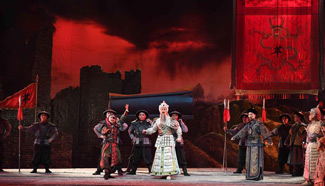LOS ANGELES, Sept. 10 (Xinhua) -- Facebook withdrew a decision to delete posts containing the iconic "napalm girl" photo from the Vietnam war on Friday after it was criticized for abusing powers of censorship.
The Pulitzer Prize-winning photo, taken by Associated Press photographer Nick Ut, is officially known as "The Terror of War" and depicts children running from a napalm attack with armed soldiers behind him. One of the children, Kim Phuc, is naked.
Napalm is a flammable liquid used in warfare. It was used by the U.S. Army during the Vietnam War primarily as an anti-person weapon, as it sticks to skin and causes severe burns when on fire.
When Norwegian writer Tom Egeland posted the photo among six others on Facebook, trying to discuss "seven photographs that changed the history of warfare," his post was deleted. And his account was subsequently suspended.
Norway's largest newspaper, Aftenposten, reported on the suspension, using the same photo in an article published on its Facebook account. Facebook reached out and asked the publisher to either remove or pixelate the photo.
Before Aftenposten could respond, Facebook deleted the article and image from the newspaper's homepage earlier this week.
Norwegian Prime Minister Erna Solberg also joined the debate, posting on her Facebook page, "Facebook gets it wrong when they censor such images." Hours later, Solberg's post, which included the image, disappeared from her account.
On Friday, Facebook decided to give in to the public outcry and said it would restore the image.
"An image of a naked child would normally be presumed to violate our community standards, and in some countries might even qualify as child pornography," a Facebook spokeswoman said.
"In this case, we recognize the history and global importance of this image in documenting a particular moment in time," she added.
While Facebook admitted that the photo is iconic, it also asserted that it was difficult to create a "distinction between allowing a photo of a nude child in one instance and not others."
Facebook has repeatedly said it is only a tech company, not a media organization. But its zealous censorship has cited many criticisms.
In July, Facebook took down a live video posted by a U.S. woman that showed her boyfriend's last breath after being fatally shot by police. The company later restored the video after a public outcry.










